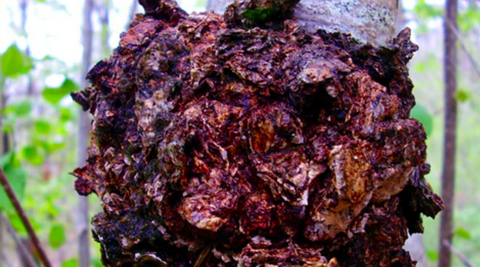Chaga mushrooms have been growing in popularity as a superfood in recent years, despite their presence in traditional Eastern medicine. Chaga has many health benefits, including anti-inflammation, immune support, and promoting gut health. First, let's dive into what makes chaga essential and why it's one of our favorite functional mushrooms.
What Are Chaga Mushrooms?
Chaga is a functional mushroom with a long history of traditional Eastern medicine used for health benefits in many cultures, including traditional Asian, European, African, and North American indigenous medicine.
Chaga is often found in the wild, growing on the trunk of birch trees. However, if you ever come across the chaga mushroom, you may not think it's a mushroom due to its dirt-like appearance disguised under orange textures.

Why Is Chaga Growing In Popularity?
As performance and overall wellness are the keys to cultivating success in sports, more and more individuals are looking for ways to optimize their performance. Functional mushrooms are growing in popularity due to their adaptogenic properties that enable the body to rest, recharge and recover. Therefore, many people take chaga for several health-related purposes, such as reducing inflammation, boosting the immune system, and being a powerful antioxidant.
The Health Benefits of Chaga Mushrooms
Nutrient-Dense Food
Did you know that the chaga mushroom is a superfood because it's dense in essential nutrients needed for optimal health? Our Guide to Superfood Nutrition mentions that Chaga is one of mother nature's humblest and most hard-working superfoods.
Chaga mushrooms are nutrient-dense because they have several minerals, vitamins, and nutrients.
Chaga mushrooms contain:
- Vitamin D
- Copper
- Magnesium
- Fiber
- Amino acids
- Iron
- Zinc
- Calcium
Learn more about the research.
Have Adaptogenic Properties
Our Beginner's Guide to Functional Mushrooms states that most functional mushrooms have adaptogenic properties. For example, chaga is an adaptogen that helps the body manage and regulate stress and fatigue to ensure optimal mental and physical health performance. Research shows us that adaptogenic substances in the body have been proven to gradually increase the body's ability to reduce feelings of fatigue, boost mental performance, balance hormones, and support the immune system.
Fight Inflammation
Chaga holds significant anti-inflammatory properties due to its being high in antioxidants. According to research on inflammation, long-term inflammation can result in a list of harmful illnesses and conditions from asthma, allergies, tuberculosis, rheumatoid arthritis, diabetes, chronic liver disease, and cardiovascular disease.
Support the Immune system
The COVID-19 pandemic and the flu season have made people eager to find ways to strengthen their immune systems. Chaga is a natural plant-based solution that can boost your immune system, giving you the extra protection to fight illness and infection.
Animal research shows that chaga mushrooms can help boost your immune system, providing extra protection from illness and infection. It does this, in part by promoting the production of cytokines, a protein that helps regulate the immune system. It's also one of the most potent sources of antioxidants under the superfood umbrella, like blueberries and spinach, further enhancing its immune-boosting properties.
Improve Sleep
Did you know that getting a good night's quality sleep can impact your mental health, physical health, immunity, mood, and more? Chaga contains stress-coping adaptogenic properties; it helps improve sleep cycles and fight insomnia. Working towards optimal performance should be part of your daily routine; the same way training and nutrition are essential is sleep.
High in Antioxidant Properties
Chaga is high in antioxidant properties. An antioxidant is a compound that prevents oxidation from taking place in the body and protects the cells in your body from damage.
Like other superfoods, chaga contains several nutrients that contribute to positive health benefits, including amino acids, minerals, and bioactive compounds.
The benefits of chaga mushrooms include:
- Reduce skin inflammation and combat breakouts
- Prevent premature aging
- Calm skin sensitivities and skin allergies
- Nourish the skin, hair, and nails
Support Gut & Digestive Health
Chaga mushrooms have also been used to support gut and digestive health. For example, a recent study on mice found that chaga reduces inflammation and fights harmful bacteria, especially gastrointestinal inflammation. In addition, functional mushrooms like chaga are natural and gut-friendly, so they can help keep a healthy gut and prevent leaky gut and irritable bowel syndrome.
Learn more about the research around gut health in The Best mushrooms to Support Your Gut & Digestive Health blog.
Reduce Stress, Anxiety & Fatigue
Chaga mushrooms are adaptogenic, which means that they allow the body to manage to regulate stress for optimal functioning. Whether you're an athlete, an entrepreneur, or every hustler look, we understand the pressures associated with high performance. We love that you can reduce and manage stress and anxiety to perform better at work, on the field, on the court, or in the training field.
Promote Liver Support
Another benefit of the chaga mushroom is protecting the liver from certain liver illnesses. For example, a study concluded that chaga extracts could protect liver tissues from harmful chemicals such as tetra-butyl hydroperoxide, which are known to cause liver damage. In addition, chaga's high antioxidative properties can also reduce oxidative stress in the body, leading to chronic liver diseases.
Prevent Anti-Aging
The use of chaga mushrooms has been around for centuries, and it's often nicknamed the "king of mushrooms" due to its potent health properties. Chaga contains high antioxidants and anti-inflammatory properties essential to prevent premature anti-aging. In addition, according to research, the chaga has been found to reduce facial wrinkles caused by UV lights.
Ways to Consume Chaga mushrooms
Chaga mushrooms aren't like the regular mushrooms you'd find at the grocery store. Instead, you may need to go to a specialty store or order directly online from our Online Store.
For multiple centuries, people worldwide have been consuming chaga mushrooms in the form of broths, soups, and herbal teas. Today, you have the option of capsules and cocoa with an equal mushroom blend of chaga, cordyceps, lion's mane, and reishi.
Hekate Functional Mushrooms
Start your day off the right way by using the Daily Functional Mushroom Cocoa by simply adding half a teaspoon to any of the following:
- Coffee
- Steamed oat milk
- Smoothie
- Oatmeal
- Hot cocoa
- A bowl of fruit
- Any other meal of your choice.
Suppose you need something to take to work, the gym, training, etc. In that case, we recommend our Daily Functional Mushroom Capsules to bring wherever you go. You have to take three capsules daily to feel the full effects.

Recommended Dosage
Our Hekate mushroom products are organic, GMO-free, vegan, and gluten-free.
We recommend a daily dosage of 3 capsules for our Daily Functional Mushroom capsules, containing 125mg of reishi mushrooms per serving.
If you're taking our Daily Functional Mushroom Cocoa, we recommend taking half a teaspoon at the start of your day, or, before you train or, workout. Each serving contains an equal dose of 125mg of chaga mushroom.
Bottom Line
So there you have it, you now know why chaga is our favorite mushroom! Chaga is packed with antioxidants that support the immune system, inflammation, and gut health to feel like your best self and #CultivateGreat.
References
https://pubmed.ncbi.nlm.nih.gov/22819687/
https://www.ncbi.nlm.nih.gov/pmc/articles/PMC3774877/
https://www.ncbi.nlm.nih.gov/pmc/articles/PMC5618583/
https://www.healthline.com/nutrition/chaga-mushroom#benefits
https://www.medicalnewstoday.com/articles/323361
https://www.medicalnewstoday.com/articles/8856
https://www.medicalnewstoday.com/articles/264419
https://www.medicalnewstoday.com/articles/323627
https://www.webmd.com/diet/health-benefits-chaga-tea#2
https://link.springer.com/article/10.1007/s00403-016-1633-z

